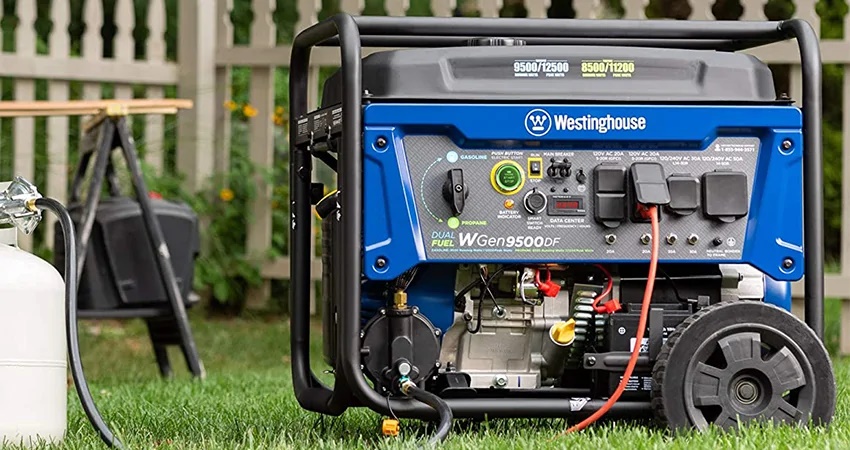Contents
How Does a Propane Generator Work?

Most of us use generators on a regular basis although not many of us might know how they work. One of the newer and efficient generators out there is the propane generator.
We will see how they work, why they are better than the other kind of generators out there, and what are their shortcomings. Hop right into the post to know about propane generators in detail
What Is A Propane Generator?
In short, when a generator uses propane as fuel for electricity, it is called a propane generator. Like all generators, propane generators do not actually generate any electricity. It converts chemical energy (from propane) into mechanical and then electrical energy
Generators are used everywhere – for either backup or places where the electrical lining is difficult like farming, construction sites, mining, developments, and short research establishments. They are easily used in places where machines are necessary but electricity is scarce and difficult to access.
Propane generators are on the hype now and there are many reasons why. Propane can serve most of the functions as that of a diesel generator but at a lower cost. They are more similar to gasoline generators.
Propane has a high calorific value and thus makes the generators very efficient and not to mention, have a higher shelf life compared to diesel generators
How Do Propane Generators Work - General Understanding
Most generators use the motion of certain atoms or molecules as means to generate electricity, some exceptions including solar-powered generators but they are technically not generators.
Requisites of a working generator are fuel, engines, and shaft(or turbines) of some kind amongst other mechanical things that are necessary for mechanical energy translation.
Fuel in this case will be propane. Is it important to note that there are no single fueled propane generators as such. It is required to create motion, like mentioned before, and is the source of transformation.
The heat generated from the fuel, either gasoline or propane in this case will be converted into some kind of motion using a combustion engine. There are two kinds of combustion engines – internal and external. The generator converts kinetic energy into electrical energy. The internal combustion engines in the case of propane generators power the rotatory shaft that in turn, turns the armature.
We’ve reviewed the best propane generators out there, but if you still want to do the research, read on to learn how to choose one and what to look for.
Technical Functionality Of A Propane generator
Propane is a petroleum-based hydrocarbon that has high flammable properties and energy production capacity. Ammonia and water are present in the generator beforehand. When the generator is started, propane gas is burnt, a lot of energy is produced, and increases the temperature of the ammonia mixture. This heat energy created by the combination of gases is then converted into electrical energy like all other similar generators
There are a variety of both portable and standby generators available in the market. Portable generators are suitable for small, short-term domestic and individual purposes while standby generators are used for when a longer duration of electricity supply is expected.
The Pros And Cons Of Propane Generators
A lot of the advantages of a propane generator are attributed to the chemical properties of propane.
Pros
- The propane generator is better for the environment compared to gas and diesel engines. It is a cleaner burning fuel for that reason and also causes lesser noise and air pollution
- It is stored in containers and thus more accessible than gasoline that should be filled from a station. Hence they are also more portable
- Diesel is more expensive to power for non-commercial purposes and gasoline is not safe to be carried around.
- Propane has a way longer shelf life. It practically never goes bad until the other storage container is damaged
- It is suitable to power both smaller domestic appliances and commercial heavy machinery or sites.
- Propane is less hazardous and dangerous as compared to other generators fueled by combustive gases
Cons
- The mechanism and construction of a propane generator are different and more complicated compared to the rest of the generators. Many of them have an injection system that is hard for a common man to understand. So maintaining can become difficult as problems inside the generator are hard to fix or even to detect sometimes
- Propane freezes in cold freezing temperatures and hence becomes unusable. In this case, other fuels take the upper hand
- Propane has a high density rate, that is, it is heavier than atmospheric air and settles down instead of evaporating. In such cases of leakage, it is very dangerous for the nearby population. Hence the propane containers have to be guarded carefully
Final Words
If you are in need of a generator that is efficient, cheap, environment friendly, and less hazardous – propane generators are the way to go. They will need some getting used to in the beginning, but note that their advantages outweigh their demerits by a large share and they are readily available in the market now and have had a huge rise in production, development, and availability in recent times, so be sure to check them out
Resources
1. The Benefits of Propane-Powered Generators https://www.cenex.com/about/cenex-information/cenexperts-blog-page/general-interest/propane-powered-generators
2.Propane(Wiki) https://en.wikipedia.org/wiki/Propane
3. propane environmental impact https://education.seattlepi.com/effects-propane-environment-5050.html